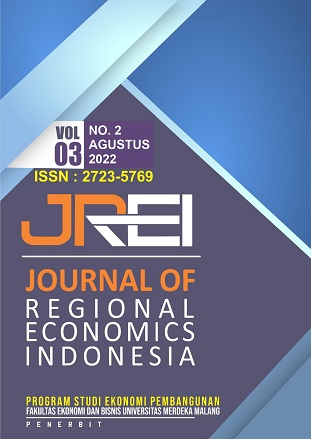Dampak Pembangunan Pariwisata terhadap Pertumbuhan Ekonomi Daerah (Studi Pembangunan Pariwisata di Kabupaten Jombang)
DOI:
https://doi.org/10.26905/jrei.v3i2.8899Abstract
Pariwisata saat ini menjadi salah satu sektor prioritas nasional karena terbukti mempunyai efek pengganda yang tinggi dalam mengakselerasi pertumbuhan ekonomi. Kabupaten Jombang adalah salah satu daerah yang berkomitmen untuk terus mendorong kinerja sektor pariwisata sebagai salah satu motor penggerak dalam menciptakan pertumbuhan ekonomi yang inklusif. Berdasarkan alasan tersebut, maka penelitian in bertujuan untuk mengukur dan menilai dampak pembangunan pariwisata Kabupaten Jombang terhadap pertumbuhan ekonomi daerah. Untuk mengukurnya, metode yang dipakai adalah statistik deskriptif dengan analisis Ordinary Least Square (OLS), dimana pertumbuhan ekonomi (PDRB) sebagai variabel dependen dan variabel independennya adalah 8 (delapan) variabel pembentuk pariwisata, yaitu: (i) jumlah objek wisata; (ii) jumlah wisatawan; (iii) jumlah investasi pariwisata; (iv) jumlah tenaga kerja bidang pariwisata; (v) pengeluaran per kapita; (vi) jumlah hotel (akomodasi); (vii) jumlah restoran (jasa makanan minuman); dan (viii) jumlah jasa perjalanan wisata. Hampir semuanya mempunyai pengaruh positif signifikan, kecuali pada variabel jumlah objek wisata dan investasi pariwisata. Hasil ini dapat menjadi rujukan untuk memprioritaskan variabel penentu pembangunan pariwisata di daerah.Downloads
References
Antonakakis, N., Dragouni, M., & Filis, G. 2014. How strong is the linkage
between tourism and economic growth in Europe? Economic
Modelling, Vol. 44, pp. 142–155.
Arslanturk, Y., Balcilar, M., & Ozdemir, Z. A. 2011. Time-varying linkages
between tourism receipts and economic growth in a small open
economy. Economic Modelling, Vol. 28, No. 2, pp. 664–671.
Assaf, A. G., & Tsionas, M. 2018. The estimation and decomposition of
tourism productivity. Tourism Management, Vol. 65, pp. 131–142.
Bilen, M., Yilanci, V., & Eryüzlü, H. 2017. Tourism development and
economic growth: A panel Granger causality analysis in the
frequency domain. Current Issues in Tourism, Vol. 20, No. 1, pp. 27–
Castro, M., Jose A. M, & MarÃa P. P. 2013. Tourism and GDP: a metaanalysis of panel data studies. Journal of Travel Research, Vol. 52, No.
, pp. 745-58.
Dritsakis, N. 2012. Tourism development and economic growth in seven
mediterranean countries: a panel data approach. Tourism Economics,
Vol. 18, No. 4, pp. 801-16.
Gabriel Brida, J., Lanzilotta, B., Lionetti, S., & Adrian Risso, W. 2010. The
tourism-led-growth hypothesis for Uruguay. Tourism Economics,
Vol. 16, No. 3, pp. 765–771.
Gautam, B. P. 2011. Tourism and economic growth in Nepal. NRB
Economic Review, Vol. 23, No. 2, pp. 18–30.
Giannopoulos, K., & Boutsinas, B. 2016. Tourism satellite account supportusing online analytical processing. Journal of Travel Research, Vol. 55,
No. 1, pp. 95–112.
Harasarn, A., & Chancharat, S. 2014. International tourism and economic
growth in thailand cointegration and the granger causality. Journal of
Environmental Management and Tourism, Vol. 5, No. 2, pp. 237–248.
Havranek, T., Horvath, R., Irsova, Z., & Rusnak, M. 2015. Cross-country
heterogeneity in intertemporal substitution. Journal of International
Economics, Vol. 96, No. 1, pp. 100–118.
Jalil, A., Mahmood, T., & Idrees, M. 2013. Tourism-growth nexus in
Pakistan: Evidence from ARDL bounds tests. Economic Modelling,
Vol. 35, pp. 185–191.
Jones, C., & Li, S. 2015. The economic importance of meetings and
conferences: A satellite account approach. Annals of Tourism Research,
Vol. 52, pp. 117–133.
Lee, C.C. & Chang, C.P. 2008. Tourism development and economic
growth: A closer look at panels. Tourism Management, Vol. 29, pp.
-192.
Lew, A. A. 2011. Tourism's role in the global economy. Tourism
Geographies, Vol. 13, No. 1, pp. 148-151.
Lew, A.A. & Ng, P.T. 2012. Using quantile regression to understand visitor
spending. Journal of Travel Research, Vol. 51, No. 3, pp. 278-288
Downloads
Published
Issue
Section
License
License JREI: Journal of Regional Economics Indonesia, University of Merdeka Malang is licensed under Creative Commons Attribution Attribution-NonCommercial-NoDerivatives 4.0 International License.
JREI: Journal of Regional Economics Indonesia, University of Merdeka Malang is licensed under Creative Commons Attribution Attribution-NonCommercial-NoDerivatives 4.0 International License.
Copyright
Authors who publish with this journal agree to the following terms:
- Authors retain copyright and grant the journal right of first publication with the work simultaneously licensed under a Creative Commons Attribution Attribution-NonCommercial-NoDerivatives 4.0 International License that allows others to share the work with an acknowledgment of the work's authorship and initial publication in this journal.
- Authors are able to enter into separate, additional contractual arrangements for the non-exclusive distribution of the journal's published version of the work (e.g., post it to an institutional repository or publish it in a book), with an acknowledgment of its initial publication in this journal.
- Authors are permitted and encouraged to post their work online (e.g., in institutional repositories or on their website) before and during the submission process, as it can lead to productive exchanges and earlier and greater citation of published work (See The Effect of Open Access).




